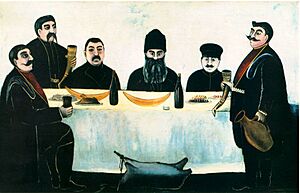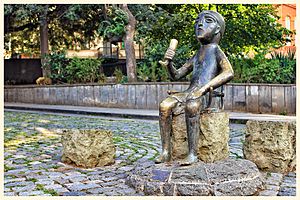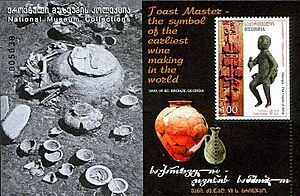Tamada facts for kids
A tamada (Georgian: თამადა) is a special leader at a Georgian party or wedding, called a supra. Think of them as a host who guides the celebration. They are like the person who leads a Greek symposium or an Anglo-Saxon sumbel.
At every supra, big or small, there is always a tamada. This person introduces each toast. Georgians sometimes joke that the tamada is like a "dictator" of the table. But it's better to think of them as a helpful leader or even a teacher.
A good tamada needs to be great with words. They should be smart, quick-thinking, and have a good sense of humor. Sometimes, guests might try to make better toasts than the tamada! At a Georgian table, the tamada helps connect the past, present, and future. They make toasts to ancestors, future generations, and everyone at the table.
Only the tamada can suggest a new toast. Other guests can then add to the idea. Some toasts are very traditional. For example, for certain toasts, all the men might stand up and drink quietly. Often, guests try to say something more original and heartfelt than the person before them. This can turn into a fun speaking contest!
In the past, the tamada had even more control. Guests had to ask permission to leave the table. If they got permission, the tamada and others would toast them before they left. If the first toast is for the tamada, someone else, usually the host, suggests it.
Choosing a Tamada: How a Leader is Picked
If a supra is very small, like a family dinner, the host usually becomes the tamada naturally. No one needs to officially choose them. For big events, like weddings, the family picks the tamada beforehand. They ask a relative or friend who is known to be a great tamada.
For medium-sized parties, the guests at the table choose the tamada together. Many things can influence this choice. Sometimes, the oldest person at the table takes on the role. In some groups, one person is always the tamada because they enjoy it and are good at it. Friends who meet often might take turns being the tamada.
Often, the oldest person at the table will suggest someone. They might say, "Kote should be our tamada, shouldn't he?" Others will agree. If Kote doesn't object, the person who suggested him raises their glass. They make the first toast to the tamada, saying "Kotes Gaumarjos" (To Kote!). Everyone else at the supra does the same. After this, the new tamada starts all the next toasts.
If the person suggested refuses, the group will suggest someone else. This continues until someone agrees to be the tamada. Then, the first toast is made to that person.
If the tamada was chosen by the family ahead of time, the oldest family member starts the drinking. They propose the first toast directly to the tamada, without any discussion. After this first toast, everyone at the supra toasts the tamada. They use a short phrase and drink their glass quickly, almost at the same time. They don't usually add many words to this first toast. Common phrases include "Kotes Gaumarjos" (to Kote) or "Kargad chaatarebinos es supra" (May he lead this supra well).
There's only one time when the first toast isn't to the tamada. This happens at small, informal supras where the host is also the tamada. In these cases, the host simply starts the party by proposing the first toast to a specific topic.
Qualities of a Good Tamada: What Makes a Great Leader

A good tamada is chosen because they have many special skills. First, they must be good with words. They speak clearly and cleverly. They can say common things in a new and interesting way. The best tamadas can even create poems on the spot!
Second, a good tamada must be well-organized. They are in charge of keeping everyone entertained. They decide when to make each toast and how often to propose new ones. This helps create a good flow for the party. They also arrange for singing or dancing between toasts. This keeps people interested and having fun.
This leads to the third quality: sensitivity. The tamada should understand the mood of the table. They try to keep a happy and lively atmosphere where everyone joins in. One Georgian said that the tamada is responsible for creating a sense of unity at the table. They should notice if someone isn't paying attention and draw them back in. They might do this with a special toast or by asking them to make an "alaverdi" (a short speech).
The tamada should also know how much people have had to drink. They can speed up or slow down the toasts as needed. Usually, toasts happen faster at the start of the evening. They slow down as the party continues. The tamada knows when guests are ready for more thoughtful or emotional toasts. If the tamada knows the guests well, they can tailor their toasts to them. This helps everyone have a great time.
Fourth, a good tamada needs to be a bit firm. They must get people to pay attention to the toasts. They also need to make sure everyone drinks each toast. This can get harder later in the evening when some people prefer to chat.
Finally, and very importantly, a good tamada must be able to drink well. The tamada is expected to empty their glass with each toast. But it's considered bad if they actually get too tipsy.
Both the tamada and the guests are expected to toast every person at the Georgian table. Each speaker tries to highlight the best and most unique qualities of the person being toasted. Georgians don't see this as flattery. They see it as a way to encourage good traits. They believe that if you tell someone they are kind and honest, they will find it hard to do bad things. If you tell them they are generous, they will try not to be greedy.
See also
In Spanish: Tamada para niños



